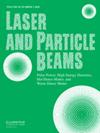超短佩瓦级激光脉冲质子束驱动聚变反应的研究
IF 1.9
4区 物理与天体物理
Q4 PHYSICS, APPLIED
引用次数: 3
摘要
我们介绍了一项投手-捕集器实验的结果,该实验利用由纳米结构靶标产生的质子束,在拍瓦级短脉冲激光设备上诱导次级靶标中的质子-硼聚变反应。采用波长为400 nm、能量为7 J或波长为800 nm、能量为14 J、强度为5 × 1021 W/cm2的45 fs激光脉冲照射薄箔靶或由氮化硼纳米管制成的近固体密度纳米结构靶。特别是,对于800 nm波长的辐照,BN纳米管靶产生的质子束的最大能量是箔靶的5倍,质子数是箔靶的10倍。这个质子束被用来照射靠近氮化硼制成的厚板,以触发11B (p, α) 2α聚变反应。一套由汤姆逊抛物线离子谱仪、射后核活化测量、中子飞行时间探测器和差分滤波固体核径迹探测器组成的诊断工具被用来测量主质子谱和聚变产物。从主质子谱中,我们计算了捕集器中的(p, n)和(α,n)反应,并与我们的测量结果进行了比较。核活化结果在定量上与计算结果一致,中子信号在定性上与计算结果一致,这使人们有信心从这些测量中获得初级粒子分布。这些结果为测量质子-硼聚变靶内离子分布提供了新的见解。本文章由计算机程序翻译,如有差异,请以英文原文为准。
Investigation of Proton Beam-Driven Fusion Reactions Generated by an Ultra-Short Petawatt-Scale Laser Pulse
We present results from a pitcher-catcher experiment utilizing a proton beam generated with nanostructured targets at a petawatt-class, short-pulse laser facility to induce proton-boron fusion reactions in a secondary target. A 45-fs laser pulse with either 400 nm wavelength and 7 J energy, or 800 nm and 14 J, and an intensity of up to 5 × 1021 W/cm2 was used to irradiate either thin foil targets or near-solid density, nanostructured targets made of boron nitride (BN) nanotubes. In particular, for 800 nm wavelength irradiation, a BN nanotube target created a proton beam with about five times higher maximum energy and about ten times more protons than a foil target. This proton beam was used to irradiate a thick plate made of boron nitride placed in close proximity to trigger 11B (p, α) 2α fusion reactions. A suite of diagnostics consisting of Thomson parabola ion spectrometers, postshot nuclear activation measurements, neutron time-of-flight detectors, and differentially filtered solid-state nuclear track detectors were used to measure both the primary proton spectrum and the fusion products. From the primary proton spectrum, we calculated (p, n) and (α,n) reactions in the catcher and compare with our measurements. The nuclear activation results agree quantitatively and neutron signals agree qualitatively with the calculations, giving confidence that primary particle distributions can be obtained from such measurements. These results provide new insights for measuring the ion distributions inside of proton-boron fusion targets.
求助全文
通过发布文献求助,成功后即可免费获取论文全文。
去求助
来源期刊

Laser and Particle Beams
PHYSICS, APPLIED-
CiteScore
1.90
自引率
11.10%
发文量
25
审稿时长
1 months
期刊介绍:
Laser and Particle Beams is an international journal which deals with basic physics issues of intense laser and particle beams, and the interaction of these beams with matter. Research on pulse power technology associated with beam generation is also of strong interest. Subjects covered include the physics of high energy densities; non-LTE phenomena; hot dense matter and related atomic, plasma and hydrodynamic physics and astrophysics; intense sources of coherent radiation; high current particle accelerators; beam-wave interaction; and pulsed power technology.
 求助内容:
求助内容: 应助结果提醒方式:
应助结果提醒方式:


